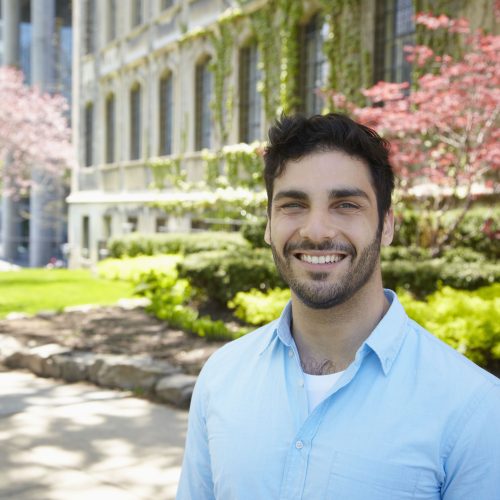Geith Maal-Bared

Geith Maal-Bared
PhD Candidate, Medical Science
“Make time for friends, family, and leisure. There’s more to life than research and academic pursuit.”
I’m a PhD candidate at the Institute of Medical Science, studying how the brain produces motivated behaviours (i.e., the drive to approach rewarding stimuli such as food and drugs or avoid aversive stimuli such as pain). Specifically, I’m interested in how a drug that was formerly pleasurable becomes, with repeated use, merely withdrawal-alleviating. In other words, the motivation to seek the substance initially constitutes a pursuit of a buzz. With chronic use, however, the same drug transforms into a means to escape the discomfort of withdrawal and craving. By understanding the molecular events occurring within these neurons, we can alter the very nature of drug experiences. In fact, we’ve shown that manipulations that target these processes can eliminate drug withdrawal thereby abolishing the need for the drug.
The highlight of my graduate experience has been working with undergraduates as a teaching assistant and in the laboratory as a mentor. In graduate school, your ideas and the fruits of your labor will be questioned and challenged — such is the nature of academia. It is easy to fall into the trap of minimizing your accomplishments and underestimating the enormous wealth of knowledge acquired. Teaching undergraduates is a fantastic remedy to this “imposter syndrome.” You quickly realize that you know a lot more than you give yourself credit for and that you can make an impact on students’ experiences at the university with relative ease. There’s also nothing quite like seeing the eagerness of undergrads when they first step foot in the lab.
As someone who has spent a lot of time teaching undergraduates, the Centre for Teaching Support & Innovation has been helpful when it comes to improving my teaching skills. They have many workshops throughout the year covering different aspects of teaching (from course syllabus design to creating informative feedback forms). They also have two teaching certificates that you can work towards if you’re interested in a teaching career. If you’re going to teach then it makes a lot of sense to utilize this resource and make the most out of your (and your students’) experience!
I have made a habit of taking gym breaks at Hart House when I need to get away from the lab bench. Hart House also has a ton of classes in various areas of athletics and art. Some of these require registration and have a fee, while others are drop-in classes. There are always interesting events going on, from plays and lectures to dinners and trivia nights. Most of all, Hart House’s community is wonderful and extremely welcoming so don’t miss out on this campus gem!
If you’re going into the sciences, choose your lab and supervisor wisely. You should base your decision on your interest in the research, whether you see yourself enjoying the day-to-day at the lab (e.g., would you be happy doing cell culture work on a regular basis?), your rapport with the supervisor and lab personnel, and whether the lab will help you achieve your ultimate goals upon graduation. I think people consider the first of these criteria but barely think about the rest. Being fascinated by the field is important but the reality is that you will be — for quite some time — employing the same techniques, working with the same people and dealing with the same supervisor. So it is of the utmost importance that you weigh those factors when choosing labs.
Ask! Don’t be shy! You will be learning a lot of new concepts and techniques. One of the most common mistakes I see new grad students make is the tendency to perseverate on a problem and the determination to solve it independently. It may also be a manifestation of imposter syndrome — asking can feel like an admission of ignorance. Regardless, research in the life sciences is collaborative for a reason: scientists have very different skill sets. People are aware of this so, rest assured, you won’t be judged if you don’t know how to run a particular process, or use a particular piece of equipment.
Make time for friends, family, and leisure. There’s more to life than research and academic pursuit. Make sure you’re making time for those that matter most in your life. Don’t neglect your hobbies. The importance of having an outlet outside the confines of the laboratory cannot be overstated.
